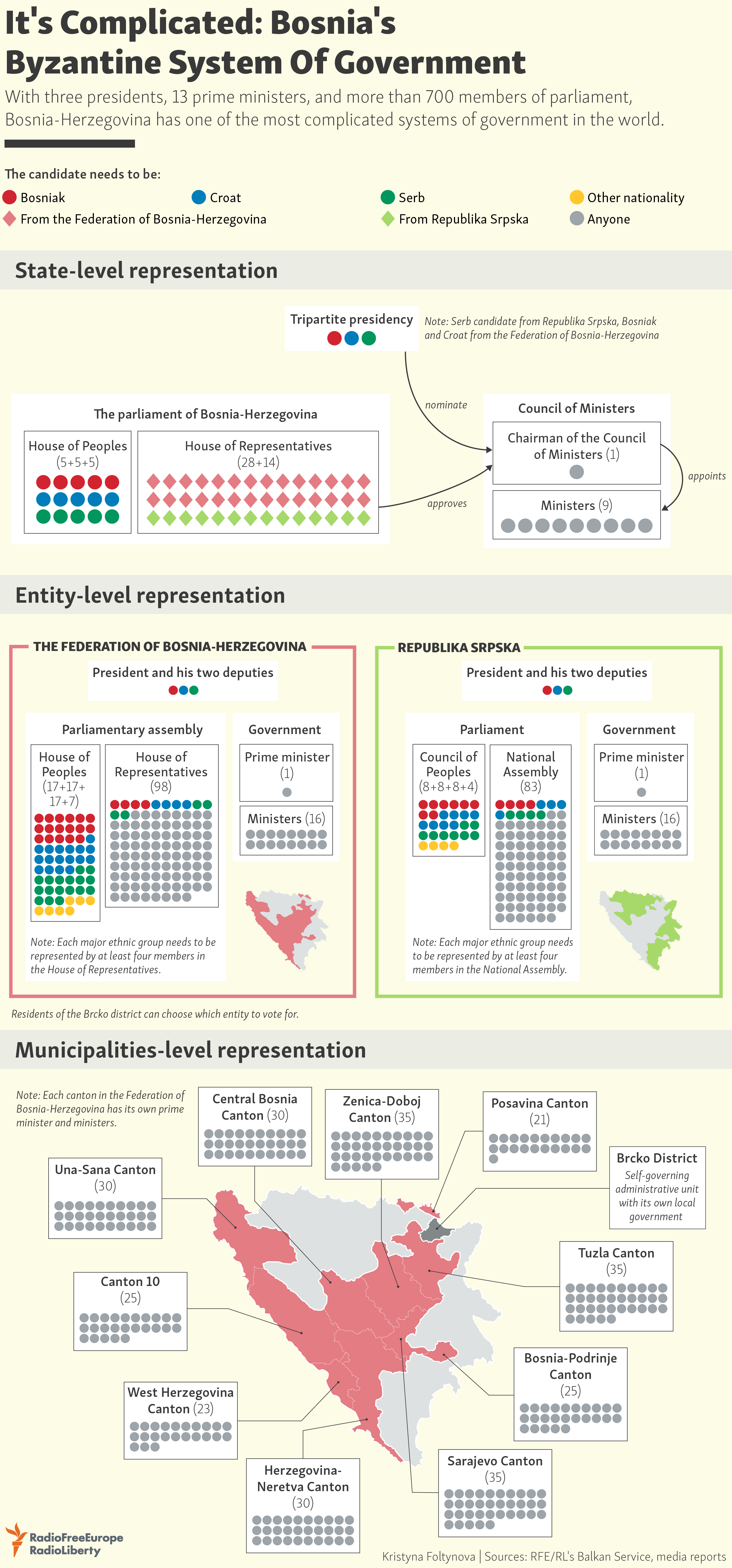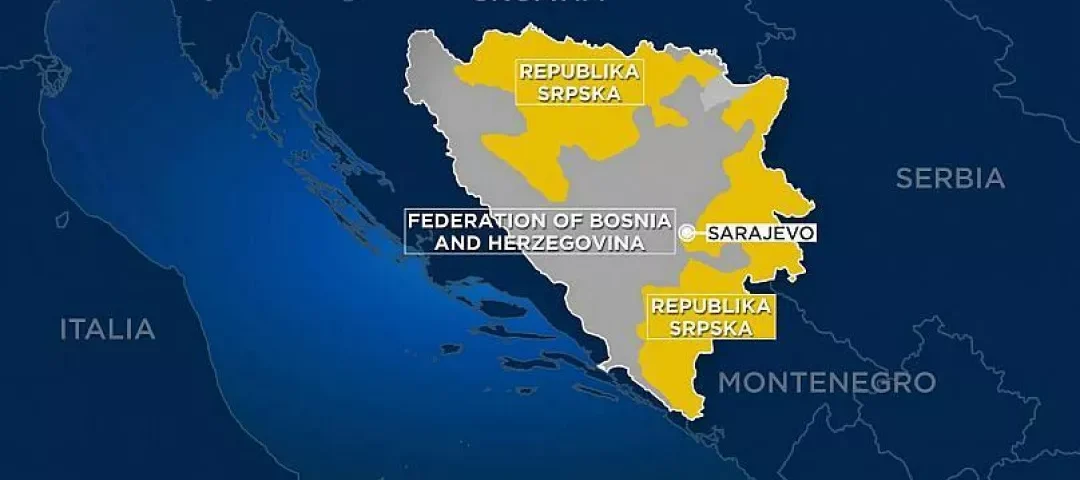Author: Khatia Davlianidze, UGSPN Research Fellow
When did the crisis begin?
Under the Dayton Peace Agreement, which ended the 1992-1995 Bosnian War, Bosnia and Herzegovina was established as a state composed of the Federation of Bosnia and Herzegovina (FBiH) and Republika Srpska. Despite the high degree of autonomy, for years, the leader of Republika Srpska has tried to build parallel institutions, push for secession from Bosnia and Herzegovina, and establish an independent state, which has fueled persistent political instability in the country.

The latest episode of Bosnia’s ongoing crisis began in February 2025, when the Constitutional Court of Bosnia and Herzegovina sentenced the leader of Republika Srpska, Milorad Dodik, to one year in prison (later commuted to a fine) and prohibited him from holding public office for six years for defying of the UN High Representative, Christian Schmidt.
The Office of the High Representative was established to oversee the civilian implementation of the Dayton Peace Agreement. It holds the authority (Bonn Powers) to enact and annul laws binding on the entities of the Federation of Bosnia and Herzegovina.
In 2023, the law adopted by the Assembly of Republika Srpska, which obstructed the implementation of decisions by the Constitutional Court of Bosnia and Herzegovina within Republika Srpska territory, was annulled by Christian Schmidt. Moreover, he amended the Criminal Code of Bosnia and Herzegovina to criminalize the disregard of decisions issued by the High Representative. Despite Schmidt’s annulment of the law, Milorad Dodik signed it and had it published in the official gazette of Republika Srpska.
The Rebellious leader of Republika Srpska
If in 2023 Milorad Dodik attempted to enforce the decisions of the Constitutional Court on the territory of Republika Srpska, in 2025 he sought to ban the activities of the Prosecutor’s Office of Bosnia and Herzegovina, the State Investigation and Protection Agency, as well as the judiciary and the High Judicial and Prosecutorial Council within Republika Srpska territory. In addition, a constitutional draft was adopted that would have granted Republika Srpska the authority to establish its own army and intelligence service; however, the Constitutional Court of Bosnia and Herzegovina annulled it in May.
Milorad Dodik, who refers to Christian Schmidt as an illegitimate representative and does not recognize the guilty verdict issued by the Constitutional Court, plans to hold a referendum in Republika Srpska on October 25 regarding the “justice” of his presidential mandate annulment.
The Republika Srpska leader’s disregard for the decisions of the High Representative and violations of the Dayton Peace Agreement are not new. In 2021, when the then-High Representative Valentin Inzko imposed prison sentences for the denial of the Srebrenica genocide and the glorification of war criminals, Dodik refused to comply and continued to refer to Radovan Karadžić and Ratko Mladić as “legends.”
For years, the leader of Republika Srpska has sought to weaken the central state institutions of Bosnia and Herzegovina and strengthen parallel structures. Dodik, who at the beginning of his political career publicly recognized the Srebrenica genocide and openly supported Bosnia’s Euro-Atlantic integration, now claims that the Srebrenica massacre is a “fabricated myth” and pursues the closure of the Office of the High Representative, the annulment of EUFOR’s mandate – established to implement the military aspects of the Dayton Agreement – and the secession of Republika Srpska from Bosnia and Herzegovina.
Dodik had already planned to hold a referendum on independence back in 2018; however, he reconsidered due to international pressure and the threat of additional sanctions.
Legally, the entities within Bosnia and Herzegovina – the Bosniak-Croat Federation and Republika Srpska – do not have a constitutional right to secession. Accordingly, any referendum held by Republika Srpska would be considered illegitimate and would be annulled either by the Constitutional Court or by the UN High Representative.
Dodik is well aware of the political consequences of scheduling a referendum on independence. Given the existing sanctions and growing international isolation, additional restrictions would not serve his interests. Consequently, it can be argued that, in Dodik’s hands, the referendum functions more as a political instrument to appeal to the Serb nationalist electorate than as a genuine tool for Republika Srpska to achieve independence.
In Search of “International” Support
Following the 2016 referendum, which sought to declare January 9 as a state holiday in violation of the Dayton Agreement, the United States imposed sanctions on Milorad Dodik. In 2022, additional sanctions were imposed against him by the United States, the United Kingdom, and member states of the European Union for “corrupt activities and attempts to undermine the state institutions of Bosnia and Herzegovina.”
Amid confrontation with the West, the main “supporter” of the leader of Republika Srpska’s separatist ambitions is the Russian Federation. Notably, just a few days after the revocation of his presidential mandate and the issuance of an arrest warrant, Milorad Dodik traveled to Moscow to seek “assistance.”
Russia, as a permanent member of the UN Security Council, requested closed consultations at the Council regarding the political situation in Bosnia and Herzegovina. According to Moscow, the judicial proceedings initiated against Dodik are politically motivated.
Milorad Dodik’s most recent visit to Russia took place on September 9, during which he met with Sergey Lavrov. According to the rebellious leader of Republika Srpska, the purpose of the visit was to secure Russian support for the closure of the Office of the UN High Representative, the termination of EUFOR’s mandate, and Republika Srpska’s pursuit of independence. However, at the subsequent press conference held by the two politicians, neither the independence of the Serb entity nor the annulment of the peacekeeping mission’s mandate was mentioned. Russia stated that it supports the Dayton Agreement; nonetheless, following the referendum scheduled for October, Dodik plans another visit to Moscow.
Russia’s Interest
For years, the positions of the Kremlin and Milorad Dodik regarding the UN High Representative have been aligned. Like the leader of the Serb entity, Russia also maintains that Christian Schmidt is an illegitimate representative.
In 2021, when Christian Schmidt replaced Valentin Inzko, Russia did not support his candidacy. Despite Russian opposition, Schmidt was appointed to the position of High Representative by the “Peace Implementation Council,” an international body established to oversee the realization of the Dayton Peace Agreement. According to Russia, he is an illegitimate representative because his appointment was made not through a UN Security Council resolution, but by a decision of the Peace Implementation Council.
Moscow’s interest, through Dodik, lies more in undermining international mechanisms in Bosnia than in openly supporting Republika Srpska’s bid for independence. By backing the ultranationalist leader of Republika Srpska, Russia seeks to destabilize the Western Balkans region by promoting political chaos in Bosnia and Herzegovina.
Following Russia’s invasion of Ukraine in 2022 and the outbreak of full-scale war, the issue of European Union enlargement returned to the agenda, providing Bosnia with the opportunity to obtain candidate status.
Legally, without the consent and participation of both entities of the Federation, the central government of Bosnia does not have the authority to implement the reforms or ratify the agreements required for EU accession. Accordingly, it is in Russia’s interest that a political force exists within the Serb entity whose separatist ambitions keep the country perpetually dysfunctional and hinder Euro-Atlantic integration.
It is probable that Moscow will continue efforts to discredit the Office of the UN High Representative, which constrains Milorad Dodik’s separatist ambitions, while refraining from openly supporting a referendum on independence. Moreover, it is unlikely that Russia, as a permanent member of the UN Security Council, would seek to block the EUFOR mission, which was established to safeguard the military provisions of the Dayton Agreement.
Undoubtedly, Russia, as a permanent member of the UN Security Council, has the right to use its veto; however, it is unlikely to do so, as there is a significant chance that, if EUFOR were annulled, NATO forces would replace it – an action that does not require the support of the UN Security Council.
How Might Events Unfold?
To ease the political crisis, Bosnia’s Central Election Commission scheduled early presidential elections in the Serb entity for November 23 of this year. Opposition political parties plan to field a joint candidate. Milorad Dodik’s party initially announced that it would not participate in the vote, although the final decision remains unknown. Even in the event of a boycott, the “Alliance of Independent Social Democrats” would be unable to derail the elections, as the majority of opposition parties have already agreed to participate.
In addition to deciding whether to participate in the elections, Milorad Dodik must determine who will lead the “Alliance of Independent Social Democrats.” According to current indications, the position is expected to be filled either by his son, Igor Dodik, or by Željka Cvijanović, the Serb member of the three-member Presidency of Bosnia and Herzegovina.
If the aforementioned party does not participate in the presidential elections, the joint opposition candidate is expected to win. Regardless of whether the “Alliance of Independent Social Democrats” recognizes the results, the elections will be considered legitimate.
Before the elections, citizens of Republika Srpska will be asked to answer the following question in the referendum scheduled in October: “Do you agree or disagree with the decisions issued against the President of Republika Srpska by the unelected foreigner Christian Schmidt, the unconstitutional court of Bosnia and Herzegovina, and the Central Election Commission’s decision to revoke Milorad Dodik’s mandate?”
The West has condemned the initiative, noting that holding a popular vote on the decisions of the High Representative and the Constitutional Court undermines judicial independence and the constitutional order of Bosnia and Herzegovina.
From a legal perspective, the validity of the referendum is questionable, as the Constitution of Bosnia and Herzegovina does not grant the Federation’s entities the authority to hold referenda on state-level decisions. The UN High Representative has the authority to annul both the referendum and its results. In 2016, when Milorad Dodik held a popular vote to declare January 9 a state holiday, the High Representative deemed it unconstitutional. It is highly likely that the referendum scheduled for October will likewise be considered illegitimate by both the High Representative and the Constitutional Court, and its results will have no legal effect.
If Dodik continues his disobedience and seeks to strengthen parallel institutions in Republika Srpska, the Constitutional Court of Bosnia and Herzegovina and the High Representative will once again curtail his separatist ambitions. Moreover, international pressure on him is likely to increase, potentially forcing him to back down. Under this scenario, early parliamentary elections in Republika Srpska could even be scheduled.
Over his 27-year political career, Milorad Dodik has navigated numerous political crises, and he will not give in this time either. However, it is doubtful that he will succeed in overcoming the current situation, as his actions have left him politically isolated both domestically and internationally. Against the backdrop of a six-year ban from holding public office and increasing international isolation, reliance only on Serbia and Russia is unlikely to produce success.
This article was translated from the original language with the assistance of AI tools and revised by the author




